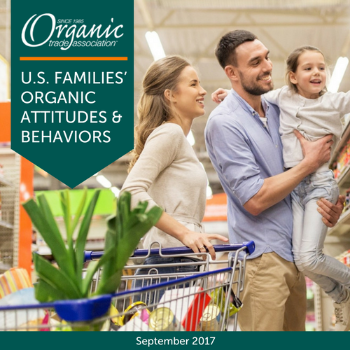
Organic Trade Association survey signals big new wave of organic consumers on the horizon
Twenty-five percent of the Millennials in America are parents. In the next 10 to 15 years, 80 percent of Millennials will be moms and dads. What this means for the organic market could be transformative.
A new and expanded survey on the organic attitude of U.S. families released Thursday by the Organic Trade Association shows that Millennials are big buyers of organic, and that becoming a parent will only deepen the strong affinity for organic shared by this powerful generation.
“Millennials are the largest consumer group in the United States, and they’re choosing organic. As more members of this generation become parents, their presence in the organic market will just get stronger,” said Laura Batcha, CEO and Executive Director of the Organic Trade Association. “This year’s survey findings clearly show the positive relationship between organic and parenting. Exciting times lie ahead for the organic sector. Over the next ten years, we’ll see a surge of new organic eaters and consumers — the Millennial parents of tomorow and their children.”
For the first time in the eight-year history of the survey, the2017 U.S. Families’ Organic Attitudes and Behaviors Study included households without children. Last year’s survey studied generational buying habits of U.S. households, and found that Millennial parents – parents in the 18- to 35-year-old age range — are now the biggest group of organic buyers in America. This year’s study goes even deeper and looks at the organic attitudes and buying habits of today’s Millennial without children.
Today’s definition of a family includes a diverse combination of household members, and this year’s survey reflects that. The study segmented the population in three household composition categories: (1) Millennials without children, (2) Millennials with children and (3) Parents aged 36 – 64 years.
The connection between organic and parenting
Becoming a parent is a life-changing event. Having children shifts our values, priorities and even our buying behaviors. And so it is with the organic consumer. The survey shows that the heavy buyer of organic – the consumer who always or most of the time chooses organic — is driven by a strong belief that selecting organic for their family makes them a better parent. That buyer is actively seeking out healthy, nutritious choices for themselves and their children – that’s the number one motivator for this group when choosing food, followed by the product being organic.
Concerns about the effects of pesticides, hormones and antibiotics on an individual’s health and the health of that individual’s children, along with the desire to avoid highly processed foods and artificial ingredients for the family were also top reasons to buy organic.
Baby food ranked as the top category for which respondents said that buying organic is extremely important, surpassing the fruits and vegetables category for the first time in the history of the survey. Food targeted to kids was also among the categories most important for buying organic.
And the parenting kids receive also shapes their buying habits as adults. Heavy buyers of organic – whether Millennials with or without children — are much more likely to have been raised eating organic foods and being taught to make organic choices. Today’s organic buyers with children are already passing their organic habits on to the next generation, and so will the Millennial parents-to-be.
Online and meal kits
Today’s organic buyers are younger, and digital technology is an integral part of their daily lives.
More Millennials shop for groceries online than older parents (40 percent vs. 30 percent). Online grocery shopping is still in its early stages, but the survey revealed that attitudes regarding online grocery shopping point to a bright future for organic. Twenty percent of those surveyed said they like the quality of organic produce purchased online, 17 percent said online grocery shopping is a convenient and easy way to shop organic, and ten percent reported an increase in organic purchases because of online shopping. This all suggests that online shopping has strong potential for increasing organic consumption among U.S. families.
Millennial parents use digital sources of information to learn about new products – online product reviews, blog posts and mobile apps — more frequently than older parents who prefer traditional information sources like commercials, coupons, and recommendations from friends. The Millennial device of choice is the smartphone versus other mobile or desktop computer devices.
As with online grocery shopping, Millennial parents are much more likely to purchase or use online meal kits than older parents (37 percent versus 27 percent). And while all groups liked the idea of getting meal kits as a gift, the Millennial without kids was the most enthusiastic about that concept.
“Americans are eating more organic than ever before. Organic sales reached nearly $50 billion last year, driven in large part by the Millennial consumer,” said Batcha. “Millennials having children over the next 10 – 15 years are projected to be a generation of highly engaged organic consumers. Our continually expanding knowledge about Millennials will help us inform this important generation of consumers and give these future parents the necessary tools to enable them to make the best choices for their families.”
The Organic Trade Association has partnered with KIWI Magazine to conduct surveys of the organic buying patterns of households since 2009. The study reflects responses of more than 1,800 households throughout the country consisting of individuals between the ages of 18 and 64 years old. Responses were collected online between May 22, 2017, and June 7, 2017.
The full study is available for purchase at OTA.com. A significant discount is available for Organic Trade Association members purchasing the study. For more information, contact Angela Jagiello.
The Organic Trade Association (OTA) is the membership-based business association for organic agriculture and products in North America. OTA is the leading voice for the organic trade in the United States, representing over 9,500 organic businesses across 50 states. Its members include growers, shippers, processors, certifiers, farmers’ associations, distributors, importers, exporters, consultants, retailers and others. OTA’s Board of Directors is democratically elected by its members. OTA’s mission is to promote and protect ORGANIC with a unifying voice that serves and engages its diverse members from farm to marketplace.
SOURCE: The Organic Trade Association








